#the ballad of the harp weaver
Text
@all-you-had-to-do-was-neigh
Others parts in my 'narrative poems' tag.
The second poll is almost ready but I take suggestions for the third !
Other poems in my 'poetry' tags (Frost, Angelou, British Romanticism so far, French poetry next).
Good luck making a pick. There are quite a few of my favorites here.
Aurora Leigh
The Ballad of the Harp Weaver
The Highwayman
Metamorphoses
Goblin Market
La Belle Dame Sans Merci
Iliad
Beowulf
The Epic of Gilgamesh
#polls#narrative poems#poetry#aurora leigh#elizabeth barrett browning#the ballad of the harp weaver#edna st vincent millay#the highwayman#alfred noyes#metamorphoses#ovid#goblin market#christina rossetti#la belle dame sans merci#john keats#iliad#homer#beowulf#the epic of gilgamesh
580 notes
·
View notes
Text
If I wrote some Alfred centric song fics based on American folks songs and poems would people read that?
#like I'm thinking Ballad of the Harp Weaver with Alfred and Arthur#and maybe Down in the Willow Garden as AmeIce?#and Katy Cruel but make it about Alfreds entrance onto the world stage#Maybe it doesn't count as a folks song but Puff The Magic Dragon but make it Alfred and Davie#anyways I know I have a number of wips rn but I find one shots a lot easier to finish and I could maybe actually do some writing this way#oh oh wait while I'm here#also the Cremation of Sam McGee with Al and Matt (obviously)#Also Wind and Rain with Al & Matt#And 500 miles about Al being homesick post revolution because I live for drama and trauma
5 notes
·
View notes
Text
White Heather & Thyme
When I pitched my idea to my teacher for my open-ended Creative Writing final project, I wanted to record a raucous blues rock song. I sat in a library, pulled out a notebook, and with the tune droning in my head I started to write the lyrics.
I usually start drafting lyrics by writing anything that comes to mind as long as it rhymes.
I'm carrying my burdens in a black leather bag
The hand of God has poked my eye for a sick immortal gag
The crows are poking the sand and chipping at my feet
Lord, I would do anything to get off this dirty street
With wordplay in mind, this was later revised as:
I've been bearing my burdens in a black leather bag
Achaean Achilles, down on her knees, dressed in Danaän drag
My skirt is but a curtain and my skin is starting to sag
The hand of God has poked me twice for some sickening gag
None of these lines would end up in the final product.
Perhaps a week later, I felt inspired by the song "Wild Mountain Thyme" and thought about adapting its melody for my project. It would be a sharp turnaround from my original plan. I had learned about the tune from the Byrds and Joan Baez. However, the tune of "Wild Mountain Thyme" is copyrighted, as opposed to other folk songs whose melodies are free to adapt anyway and anyhow.
A quick glance at the history of "Wild Mountain Thyme" shows that the song was itself adapted from a Scottish folk song called "The Braes of Balquidder." I immediately loved the version I heard by the Tannahill Weavers, and I began to play around with the tune on my guitar.
I learned to love the shimmering sound of open E tuning from Bob Dylan's outtakes of songs from his album "Blood on the Tracks." The tune of "The Braes of Balquidder" wasn't difficult to recreate on my open-tuned guitar.
One thing I changed about the tune was the addition of new chords and melody towards the end of a verse. "The Braes of Balquidder" is a little too repetitive, I thought, in its music. Other than that, the tune remained largely the same. I didn't own an E or D harmonica, so I tuned my guitar all the way down to open C, for which I did have a harp.
The drastic shift in tone from blues rock to romantic folk meant that I had to find some new and tamer lyrics. I sat in the again library and listened to a collection of crooner ballads and torch songs. I wrote the song as an extension of "The Braes of Balquidder."
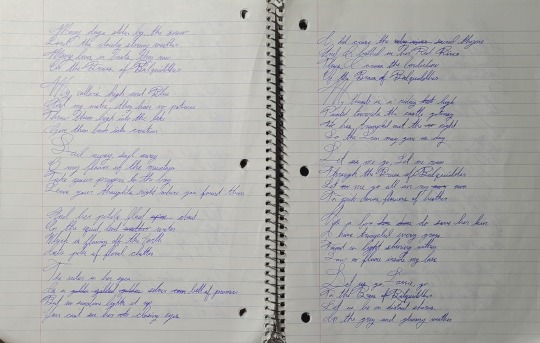
Through scrappy cursive, I wrote nearly ten pages of stream-of-conscious nonsense. I wish that I had dated these manuscripts. The ideas of "the flowers of the mountain" and "the blueberries grow 'mong the bonnie highland heather" ended up in the final draft.
I performed the song for my Creative Writing class under my flowery hat. I know that videos of this performance exist, but I don't have contact with anyone who filmed me.
The song was originally called "The Lustrous Valley" but I changed it to "White Heather & Thyme" because that would make its acronym WHAT.
Nearly a full year passed. I finally decided to publish this song with an accompanying music video.
For this video, I wanted to show handwritten lyrics overlayed on a compilation of footage I took on a wintry trip to Colorado. Somehow, I managed to lose every video I took on that trip. I have no idea how I lost it.
I was inspired by the music video for "You're Gonna Make Me Lonesome When You Go." In it, an open journal has the lyrics being written in it. I wanted to make something similar but more complex.
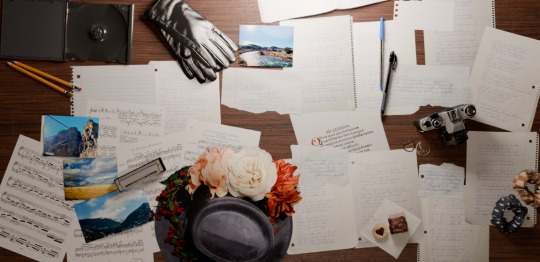
I scattered around items in Blender. They don't have any particular meaning other than a general theme of love and romance. The sheets of notebook paper are pages from my journal from when I was brainstorming the lyrics. I threw in some photos of my Colorado trip as a bonus. For specifics, I chose the poem Catullus 7 and sheet music for Les Barricades Misterieuses, Liebestraume 3, and Le Dodo ou L'amour au berceau. There is a brownie and jam cookie because we ate those on the last day of my Creative Writing class.
When it came to the write-on text, I was very particular not only about my handwriting but the words I would write. The first time, I wrote the final lyrics to the song, but on subsequent times I changed the lyrics based on the manuscripts. In the video, the lyrics reflect the first draft of the song except for this couplet:
I am armed for winter war feeling every high and low
To this terror, naught I know, but the way the breeze will blow
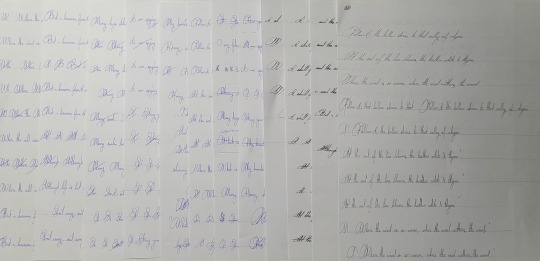
I filled the fronts and backs of pages with lazy cursive, sometimes slanted and sometimes not, sometimes fancy and sometimes simple. In the end, I opted for a slanted and loopy cursive.
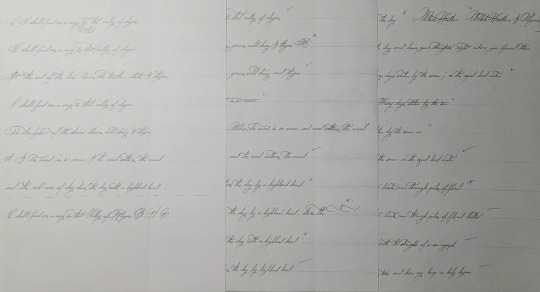
In Davinci Resolve, I traced every stroke, which was the longest and most tedious process.

I put on a couple of videos and talked to some friends, but it was still extremely boring. I would not be surprised if this part took over twenty hours in total for me to do, not just because of tracing a set of lines but tracing even more lines after I decide to redo all of the handwriting.
Afterwards, I put the text on images of torn notebook paper, then rendered it to be used in Blender.

Rendering the final animation took around five seconds per frame, and, taking into consideration some re-renders, the final render time was probably around seven hours long. As long as my sleep, anyhow, so I didn't mind.
I wouldn't say that this video was worth two weeks of inactivity on my YouTube channel, but I think it's a good excuse.
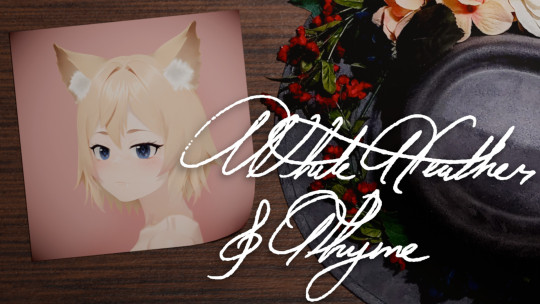
0 notes
Text

And a merry Christmas to all of you at home!
0 notes
Text
The Harp-Weaver
My mother was a confirmed night owl, and a gifted seamstress. Many’s the morning my sister and I would wake up to a brand-new home-sewn outfit, as if the shoemaker’s elves had paid a visit. And after Dad left, I don’t know how she managed to keep a roof over our head, but she did. This time of year, when the wind starts to get colder, it makes me think of “The Ballad of the Harp-Weaver,” by Edna St. Vincent Millay. And it’s a good spooky story for late October. I was lucky enough to sing in a musical setting of it a few years back; if I can find a clip of the performance I may post it as a comment.
The Ballad of the Harp-Weaver
“Son,” said my mother,
When I was knee-high,
“You’ve need of clothes to cover you,
And not a rag have I.
“There’s nothing in the house
To make a boy breeches,
Nor shears to cut a cloth with
Nor thread to take stitches.
“There’s nothing in the house
But a loaf-end of rye,
And a harp with a woman’s head
Nobody will buy,”
And she began to cry.
That was in the early fall.
When came the late fall,
“Son,” she said, “the sight of you
Makes your mother’s blood crawl,—
“Little skinny shoulder-blades
Sticking through your clothes!
And where you’ll get a jacket from
God above knows.
“It’s lucky for me, lad,
Your daddy’s in the ground,
And can’t see the way I let
His son go around!”
And she made a queer sound.
That was in the late fall.
When the winter came,
I’d not a pair of breeches
Nor a shirt to my name.
I couldn’t go to school,
Or out of doors to play.
And all the other little boys
Passed our way.
“Son,” said my mother,
“Come, climb into my lap,
And I’ll chafe your little bones
While you take a nap.”
And, oh, but we were silly
For half an hour or more,
Me with my long legs
Dragging on the floor,
A-rock-rock-rocking
To a mother-goose rhyme!
Oh, but we were happy
For half an hour’s time!
But there was I, a great boy,
And what would folks say
To hear my mother singing me
To sleep all day,
In such a daft way?
Men say the winter
Was bad that year;
Fuel was scarce,
And food was dear.
A wind with a wolf’s head
Howled about our door,
And we burned up the chairs
And sat on the floor.
All that was left us
Was a chair we couldn’t break,
And the harp with a woman’s head
Nobody would take,
For song or pity’s sake.
The night before Christmas
I cried with the cold,
I cried myself to sleep
Like a two-year-old.
And in the deep night
I felt my mother rise,
And stare down upon me
With love in her eyes.
I saw my mother sitting
On the one good chair,
A light falling on her
From I couldn’t tell where,
Looking nineteen,
And not a day older,
And the harp with a woman’s head
Leaned against her shoulder.
Her thin fingers, moving
In the thin, tall strings,
Were weav-weav-weaving
Wonderful things.
Many bright threads,
From where I couldn’t see,
Were running through the harp-strings
Rapidly,
And gold threads whistling
Through my mother’s hand.
I saw the web grow,
And the pattern expand.
She wove a child’s jacket,
And when it was done
She laid it on the floor
And wove another one.
She wove a red cloak
So regal to see,
“She’s made it for a king’s son,”
I said, “and not for me.”
But I knew it was for me.
She wove a pair of breeches
Quicker than that!
She wove a pair of boots
And a little cocked hat.
She wove a pair of mittens,
She wove a little blouse,
She wove all night
In the still, cold house.
She sang as she worked,
And the harp-strings spoke;
Her voice never faltered,
And the thread never broke.
And when I awoke,—
There sat my mother
With the harp against her shoulder
Looking nineteen
And not a day older,
A smile about her lips,
And a light about her head,
And her hands in the harp-strings
Frozen dead.
And piled up beside her
And toppling to the skies,
Were the clothes of a king’s son,
Just my size.
--Edna St. Vincent Millay, 1922
#poetry#twentieth century poetry#edna st. vincent millay#the ballad of the harp weaver#mother#fairy tale#poem#autumn#enchanted harp#female poets
10 notes
·
View notes
Quote
A ballad is the simplest four-line verse we have in English. With its clear rhymes and even beats, it tells a plain story as simply as a song or a nursery rhyme. But it is never an exercise in innocence, for it almost always a tale of violence ending in death. Millay's is no exception. Although "The Ballad of the Harp-Weaver" may be read to bear two messages, both are fraught with peril. Millay is using the story of her own childhood and her mother's, each with its iron poverty and maternal self-sacrifice, to equip her child for a grander life than any she would ever know without her. She is a daughter transformed into a son—and no ordinary son of a poor mother to a king's son, a royal. It is he who writes the poem.
Savage Beauty: The Life of Edna St. Vincent Millay, by Nancy Milford
3 notes
·
View notes
Text
Edna St. Vincent Millay’s Harp-Weaver
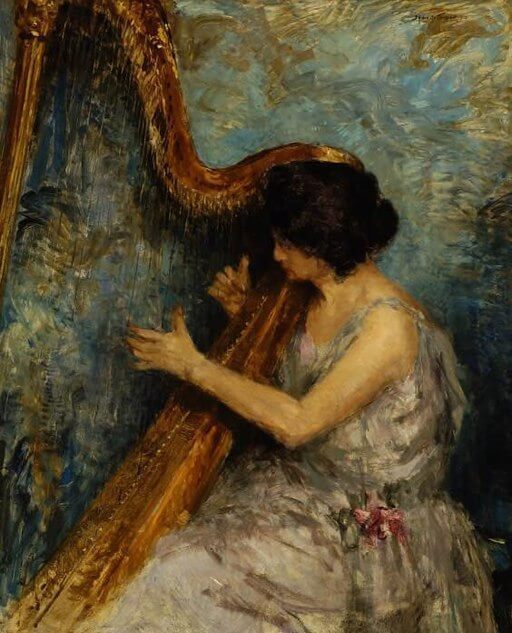
Edna St. Vincent Millay earned the Pulitzer for the Harp-Weaver:"There's nothing in the house But a loaf-end of rye,And a harp with a woman's head Nobody will buy," And she began to cry." https://americanliterature.com/author/edna-st-vincent-millay/poem/the-ballad-of-the-harp-weaver
#harp-weaver#ednastvincentmillay#millay#pulitzer#pulitzerpoems#ballads#poemoftheday#americanliterature
0 notes
Text
The Weaver’s Song explanation
And what connection it has to the harp in acosf (very boring but helps all the SJM theorists)
The words of her song became clear now, her voice sweet and beautiful; like sunlight on a stream. “There where two sisters, they went playing to see they’re father’s ships come sailing…and when they came unto the sea brim, the elder did push the younger in.” A honeyed voice, for an ancient, horrible song.
“Sometimes she sank, and sometimes she swam, ‘til her corpse came to the Miller’s dam. But what did he do with her breast bone? he made him a viol to play on. What did he do with her finger’s so small? He made pegs to his viol withall.”
“And what did he do with her nose ridge? Unto his viol he made a bridge; And what did he do with her veins so blue? He made strings to his viol thereto.”
“What did he do with her eyes so bright? On his viol he set at first light. What did he do with her tongue so rouge? ‘Twas the new till and it spoke enough.”
"Then bespake the treble string, O yonder is my father the king.”
"Then bespake the second string, 'O yonder sits my mother the queen.”
“Then bespake the strings all three, ‘Yonder is my sister that drowned me.”
Acomaf, P. 217-221
The song is based off English folklore, like a lot of SJM’s writing, folklore is involved. For example, Acotar is based off ‘Beauty and the Beast’, Which originally comes from a very widespread folktale. Plus the very loose Cinderella retelling in ToG, which is still originally a folktale.
The Folklore in the Weaver’s song is: "The Twa Sisters" ("The Two Sisters") is a traditional murder ballad, dating at least as far back as the mid seventeenth century. The song recounts the tale of a girl drowned by her jealous sister. At least 21 English variants exist under several names, including "Minnorie" or "Binnorie", "The Cruel Sister", "The Wind and Rain", "Dreadful Wind and Rain", "Two Sisters", "The Bonny Swans" and the "Bonnie Bows of London".
And I’ll explain why this folklore actually does have a connection with The Harp in Acosf + some other less significant elements in the tale which I picked up on in the Weaver scene.
‘Binnorie’
Once upon a time there were two king's daughters lived in a bower near the bonny mill-dams of Binnorie. And Sir William came wooing the eldest and won her love and plighted troth with glove and with ring. But after a time he looked upon the youngest, with her cherry cheeks and golden hair, and his love grew towards her till he cared no longer for the eldest one. So she hated her sister for taking away Sir William's love, and day by day her hate grew upon her, and she plotted and she planned how to get rid of her.
So one fine morning, fair and clear, she said to her sister, "Let us go and see our father's boats come in at the bonny mill-stream of Binnorie." So they went there hand in hand. And when they got to the river's bank the youngest got upon a stone to watch for the coming of the boats. And her sister, coming behind her, caught her round the waist and dashed her into the rushing mill-stream of Binnorie. "O sister, sister, reach me your hand!" she cried, as she floated away, "and you shall have half of all I've got or shall get."
"No, sister, I'll reach you no hand of mine, for I am the heir to all your land. Shame on me if I touch the hand that has come 'twixt me and my own heart's love."
"O sister, O sister, then reach me your glove!" she cried, as she floated further away, "and you shall have your William again."
"Sink on," cried the cruel princess, "no hand or glove of mine you'll touch. Sweet William will be all mine when you are sunk beneath the bonny mill-stream of Binnorie." And she turned and went home to the king's castle.
And the princess floated down the mill-stream, sometimes swimming and sometimes sinking, till she came near the mill. Now the miller's daughter was cooking that day, and needed water for her cooking. And as she went to draw it from the stream, she saw something floating towards the mill-dam, and she called out, "Father! father! draw your dam. There's something white—a merry maid or a milk-white swan— coming down the stream." So the miller hastened to the dam and stopped the heavy cruel mill-wheels. And then they took out the princess and laid her on the bank.
Fair and beautiful she looked as she lay there. In her golden hair were pearls and precious stones; you could not see her waist for her golden girdle; and the golden fringe of her white dress came down over her lily feet. But she was drowned, drowned!
And as she lay there in her beauty a famous harper passed by the mill- dam of Binnorie, and saw her sweet pale face. And though he travelled on far away he never forgot that face, and after many days he came back to the bonny mill-stream of Binnorie. But then all he could find of her where they had put her to rest were her bones and her golden hair. So he made a harp out of her breast-bone and her hair, and travelled on up the hill from the mill-dam of Binnorie, till he came to the castle of the king her father.
That night they were all gathered in the castle hall to hear the great harper—king and queen, their daughter and son, Sir William and all their Court. And first the harper sang to his old harp, making them joy and be glad or sorrow and weep just as he liked. But while he sang he put the harp he had made that day on a stone in the hall. And presently it began to sing by itself, low and clear, and the harper stopped and all were hushed.
And this was what the harp sung: "O yonder sits my father, the king, Binnorie, O Binnorie; And yonder sits my mother, the queen; By the bonny mill-dams o' Binnorie, "And yonder stands my brother Hugh, Binnorie, O Binnorie; And by him, my William, false and true; By the bonny mill-dams o' Binnorie."
Then they all wondered, and the harper told them how he had seen the princess lying drowned on the bank near the bonny mill-dams o' Binnorie, and how he had afterwards made this harp out of her hair and breast-bone. Just then the harp began singing again, and this was what it sang out loud and clear: "And there sits my sister who drownèd me by the bonny mill-dams o' Binnorie." And the harp snapped and broke, and never sang more.
Now I’m thinking, is this how the harp was made?? We all know the harp can speak or sing in acosf, because we read that it sings to Nesta.
Other insignificant elements in the Weaver Scene
In Bonnorie, it says: ‘In her golden hair were pearls and precious stones;’
When Feyre observes the inside of The Weaver’s cottage, it points out pearls twice + several of the 7 precious gemstones; the diamond, the pearl, the ruby, the sapphire, the emerald, the oriental catseye, and the alexandrite. Other gemstones are also in the scene.
“A large main room, with a small, shut door in the back, Floor to ceiling shelves lined the walls, crammed with bric-a-brac: books, shells, dolls, herbs, pottery, shoes, crystals, more books, jewels. .. From the ceiling and wood rafters hung all manner of chains, dead birds, dresses, ribbons, gnarled bits of wood, strands of pearls…”
“I rose on my toes to examine the shelf. An old letter knife, books in leather that I did not want to touch or smell; a handful of acorns, a tarnished crown of ruby and jasper, and- A ring. A ring of twisted strands of gold and silver, flecked with pearls, and set with a stone of deepest, solid blue. Sapphire-_but different. I'd never seen a sapphire like that”
Sarah deliberately added this and you can’t convince me otherwise.
#the weaver#Acomaf#sjm#sjm theories#sarahjmaas#acotar#acosf#the harp#the dread trove#a court of thorns and roses#a court of mist and fury#a court of silver flames#the weaver theory
18 notes
·
View notes
Text
Lyric poetry that sings!
Lyric poetry that sings!
Edna St. Vincent Millay (1892-1950) is my favorite American woman poet. She won a Pulitzer in 1923. My favorite poem is “The Ballad of the Harp Weaver.” (April is National Poetry Month)
“Son,” said my mother,
When I was knee-high,
“You’ve need of clothes to cover you,
And not a rag have I.
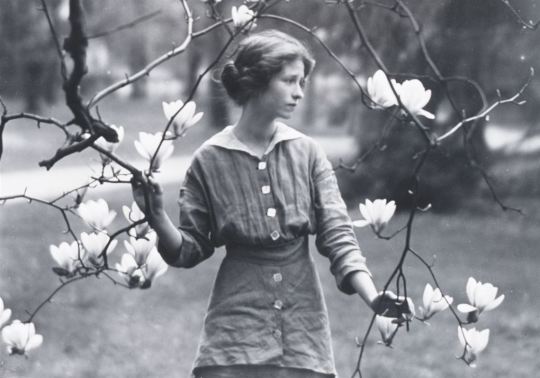
View On WordPress
2 notes
·
View notes
Text
reading list - narrative & dramatic poetry
CLICK HERE TO ACCESS MY OTHER READING LISTS.
✵ ACTIVELY UPDATING ✵
☐ APOLLONIUS RHODIUS – Argonautica
☐ ARISTOTLE – Poetics
☐ BÉROUL – Tristan
☐ BLAKE, William – Songs of Innocence and Experience
☐ BROWNING, Robert – Home: Thoughts from Abroad
☐ BROWNING, Robert – The Laboratory
☐ BYRON, Lord – all narrative poems
☐ CAMÕES, Luis Vaz de – Os Lusíadas
☐ CARSON, Anne – Autobiography of Red
☐ CHRÉTIEN de TROYES – Arthurian cycle
☐ COLERIDGE, Samuel Taylor – The Rime of the Ancient Mariner
☐ DANTE – Divina Commedia
☐ GLÜCK, Louise – Averno
☐ GLÜCK, Louise – Meadowlands
☐ HESIOD – Theogony
☐ HOMER – The Illiad
☐ HOMER – The Odyssey
☐ HORACE – Ars Poetica
☐ ITALICUS, Silius – Punica
☐ KEATS, John – Endymion
☐ KEATS, John – Ode on Indolence
☐ LONGFELLOW, Henry Wadsworth – The Song of Hiawatha
☐ LUCAN – Pharsalia
☐ LUCRETIUS – De rerum natura
☐ MACAULAY, Thomas Babington – Lays of Ancient Rome
☐ MARTIALIS, Marcus Valerius – Epigrammata
☐ MICKIEWICZ, Adam – Pan Tadeusz
☐ MILLAY, Edna St. Vincent – The Ballad of the Harp-Weaver
☐ MIŁOSZ, Czesław – Traktat poetycki
☐ MILTON, John – Paradise Lost
☐ OSWALD, Alice – Memorial
☐ OVID – Metamorphoses
☐ OVID – Fasti
☐ SHAKESPEARE, William – The Seven Ages of Man
☐ STATIUS, Publius Papinius – Thebaid
☐ STATIUS, Publius Papinius – Achilleid
☐ TENNYSON, Alfred – Idylls of the King
☐ UNATTRIBUTED – Epic of Gilgamesh
☐ UNATTRIBUTED – Beowulf
☐ UNATTRIBUTED – La Chanson de Roland
☐ UNATTRIBUTED – Sasna cṙer
☐ UNATTRIBUTED – El Cantar de mio Cid
☐ UNATTRIBUTED – Der Nibelunge liet
☐ VALERIUS FLACCUS, Gaius – Argonautica
☐ VIRGIL – The Aeneid
☐ VIRGIL – Georgics
☐ WALCOTT, Derek – Omeros
POETS
GOETHE, Johann Wolfgang von
HARDY, Thomas
TENNYSON, Alfred
#books#literature#reading list#what to read#poetry#narrative poetry#dramatic poetry#academia#give me recommendations
4 notes
·
View notes
Photo

Edna St. Vincent Millay, from Collected Lyrics; “The Ballad of the Harp-Weaver”
7 notes
·
View notes
Text
Summary: After a mining accident makes him unable to work Arthur would do anything to give his son Alfred new clothes for Christmas. Based on the poem Ballad Of The Harp Weaver by Edna St. Vincent Millay.
For those unfamiliar with the original poem, this is like, the opposite of a fluffy Christmas fic. Please don't read if you don't like angst.
4 notes
·
View notes
Text
The Ballad of the Harp-Weaver
BY EDNA ST. VINCENT MILLAY
“Son,” said my mother,
When I was knee-high,
“You’ve need of clothes to cover you,
And not a rag have I.
“There’s nothing in the house
To make a boy breeches,
Nor shears to cut a cloth with
Nor thread to take stitches.
“There’s nothing in the house
But a loaf-end of rye,
And a harp with a woman’s head
Nobody will buy,”
And she began to cry.
That was in the early fall.
When came the late fall,
“Son,” she said, “the sight of you
Makes your mother’s blood crawl,—
“Little skinny shoulder-blades
Sticking through your clothes!
And where you’ll get a jacket from
God above knows.
“It’s lucky for me, lad,
Your daddy’s in the ground,
And can’t see the way I let
His son go around!”
And she made a queer sound.
That was in the late fall.
When the winter came,
I’d not a pair of breeches
Nor a shirt to my name.
I couldn’t go to school,
Or out of doors to play.
And all the other little boys
Passed our way.
“Son,” said my mother,
“Come, climb into my lap,
And I’ll chafe your little bones
While you take a nap.”
And, oh, but we were silly
For half an hour or more,
Me with my long legs
Dragging on the floor,
A-rock-rock-rocking
To a mother-goose rhyme!
Oh, but we were happy
For half an hour’s time!
But there was I, a great boy,
And what would folks say
To hear my mother singing me
To sleep all day,
In such a daft way?
Men say the winter
Was bad that year;
Fuel was scarce,
And food was dear.
A wind with a wolf’s head
Howled about our door,
And we burned up the chairs
And sat on the floor.
All that was left us
Was a chair we couldn’t break,
And the harp with a woman’s head
Nobody would take,
For song or pity’s sake.
The night before Christmas
I cried with the cold,
I cried myself to sleep
Like a two-year-old.
And in the deep night
I felt my mother rise,
And stare down upon me
With love in her eyes.
I saw my mother sitting
On the one good chair,
A light falling on her
From I couldn’t tell where,
Looking nineteen,
And not a day older,
And the harp with a woman’s head
Leaned against her shoulder.
Her thin fingers, moving
In the thin, tall strings,
Were weav-weav-weaving
Wonderful things.
Many bright threads,
From where I couldn’t see,
Were running through the harp-strings
Rapidly,
And gold threads whistling
Through my mother’s hand.
I saw the web grow,
And the pattern expand.
She wove a child’s jacket,
And when it was done
She laid it on the floor
And wove another one.
She wove a red cloak
So regal to see,
“She’s made it for a king’s son,”
I said, “and not for me.”
But I knew it was for me.
She wove a pair of breeches
Quicker than that!
She wove a pair of boots
And a little cocked hat.
She wove a pair of mittens,
She wove a little blouse,
She wove all night
In the still, cold house.
She sang as she worked,
And the harp-strings spoke;
Her voice never faltered,
And the thread never broke.
And when I awoke,—
There sat my mother
With the harp against her shoulder
Looking nineteen
And not a day older,
A smile about her lips,
And a light about her head,
And her hands in the harp-strings
Frozen dead.
And piled up beside her
And toppling to the skies,
Were the clothes of a king’s son,
Just my size.
1 note
·
View note
Quote
In Millay's "The Ballad of the Harp-Weaver," the emotional intensity builds up as one waits for something dreadful to happen. In the penultimate quatrain the mother dies equipping her son for life. That is, in fact, the second theme of the poem. The first is maternal self-sacrifice. The ballad could have been resolved in any number of ways, but the mother's death, while seeming to be sentimental, is so charged with feeling that instead it serves perfectly to resolve the poem.
Savage Beauty: The Life of Edna St. Vincent Millay, by Nancy Milford
1 note
·
View note
Text
OCTOBER 19: Edna St. Vincent Millay (1892-1950)
The famous American poet and playwright Edna St. Vincent Millay passed away on this day in 1950. Only the third woman to ever win the Pulitzer Prize for Poetry, she is believed to have been an early bisexual icon for her affairs with both men and women.
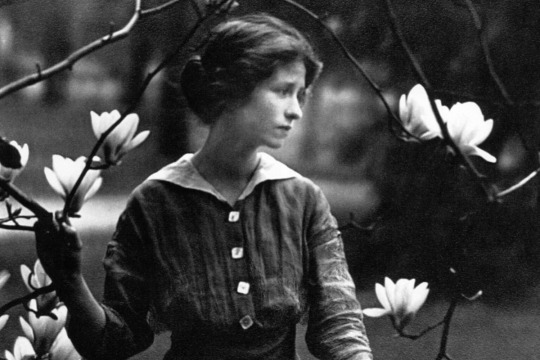
Edna St. Vincent Millay in Mamaroneck, NY, 1914, by Arnold Genthe (x).
Edna St. Vincent Millay was born on February 22, 1892 in Rockland, Maine. Her family was of modest means, her father being a schoolteacher and her mother a nurse. Her middle name St. Vincent was derived from the hospital in New York City, where her uncle’s life had been miraculously saved not long before her birth. Edna would later write of her childhood and say that she and her family lived “between the mountains and the sea where baskets of apples and drying herbs on the porch mingled their scents with those of the neighboring pine woods.” After her parents divorced, Edna’s mother traveled around Maine with she and her sisters never staying in one place too long. Despite her unconventional education, Edna was eventually awarded a scholarship to Vassar College.
It was at Vassar where her affairs with other women began, most notably with the English actress Edith Wynne Matthison, who was over twice Edna’s age. After graduating in 1917, she moved to New York City and lived in the bohemian neighborhood of Greenwich Village where she built a life for herself that she would later describe as having been “very, very poor and very, very merry.” Although poetry was her main aim, Edna began seeing much success as a playwright; she had lucrative careers with both the Provincetown Players and the Theater Guild. Many of her plays and poems are now legendary for their lesbian subtext, such as “The Lamp and the Bell,” Aria da Capo, and "Renascence.” She would earn her spot in the history textbooks in 1923 after winning the Pulitzer Prize for Poetry for her piece "The Ballad of the Harp-Weaver,” becoming just the third woman to ever be awarded the Pulitzer Prize for Poetry.
One of Edna’s greatest loves was the talented sculptor and famous lesbian expat Thelma Wood, who she met after moving to Paris in January of 1921. Her relationships with men included a 26-year long marriage to lawyer and war correspondent Eugen Jan Boissevain, as well as a lengthy affair with the poet George Dillon. During World War I, Edna was a staunch pacifist and contributed to the active anti-war campaign in her literary circle; however, she changed her position with the dawn of World War II and supported the Allied Forces. She made literary history once again in 1943 when she became the second woman to every be awarded the Frost Award.
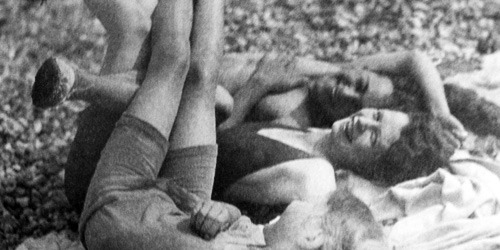
Edna photographed laughing with her friends in Paris, including her lover Thelma Wood (x).
Following an accident where she fell down the stairs in her home, Edna suffered a heart attack and passed away on October 19, 1950 at the age of 58. She was buried next to her husband Eugen, who had passed away only a year earlier. Her estate and bisexual legacy was eventually restored and brought to prominence in the literary canon thanks to the work of her sister Norma, biographer Nancy Millford, and fellow Pulitzer Prize winning poet and wlw Mary Oliver.
-LC
#365daysoflesbians#edna st. vincent millay#thelma wood#mary oliver#bisexuality#biseuxal#bi#bisexual history#bi history#bi women#lgbt#lgbtq#gay#lesbian#lesbian history#lgbt history#lgbtq history#wlw history#wlw#sapphic#gay history#people#1950s#20th century#usa
155 notes
·
View notes
Text
Edna St. Vincent Millay - Love is not all.
Poet and playwright Edna St. Vincent Millay was born in Rockland, Maine, on February 22, 1892. Her mother, Cora, raised her three daughters on her own after asking her husband to leave the family home in 1899.
Cora encouraged her girls to be ambitious and self-sufficient, teaching them an appreciation of music and literature from an early age. In 1912, at her mother’s urging, Millay entered her poem “Renascence” into a contest: she won fourth place and publication in The Lyric Year, bringing her immediate acclaim and a scholarship to Vassar College.
There, she continued to write poetry and became involved in the theater. She also developed intimate relationships with several women while in school, including the English actress Wynne Matthison.
In 1917, the year of her graduation, Millay published her first book, Renascence and Other Poems. At the request of Vassar’s drama department, she also wrote her first verse play, The Lamp and the Bell (1921), a work about love between women.
In 1923 her fourth volume of poems, The Ballad of the Harp-Weaver, was awarded the Pulitzer Prize. In addition to publishing three plays in verse, Millay also wrote the libretto of one of the few American grand operas, The King’s Henchman (1927).
Love Is Not All - Poem
Love is not all: it is not meat nor drink
Nor slumber nor a roof against the rain;
Nor yet a floating spar to men that sink
And rise and sink and rise and sink again;
Love can not fill the thickened lung with breath,
Nor clean the blood, nor set the fractured bone;
Yet many a man is making friends with death
Even as I speak, for lack of love alone.
It well may be that in a difficult hour,
Pinned down by pain and moaning for release,
Or nagged by want past resolution's power,
I might be driven to sell your love for peace,
Or trade the memory of this night for food.
It well may be. I do not think I would.
1 note
·
View note